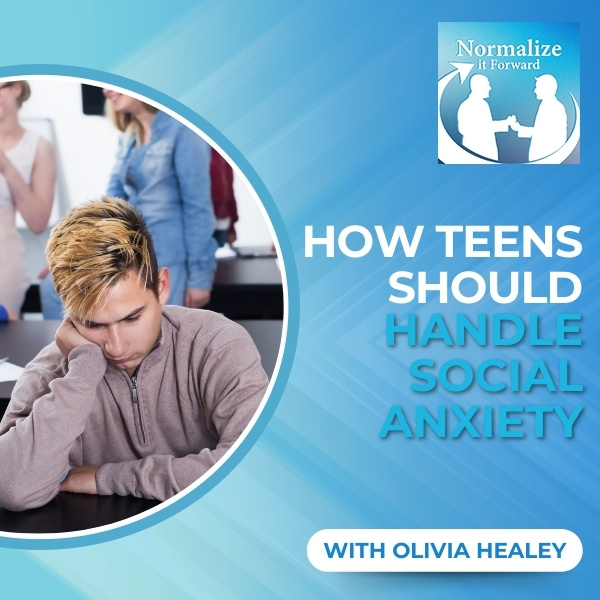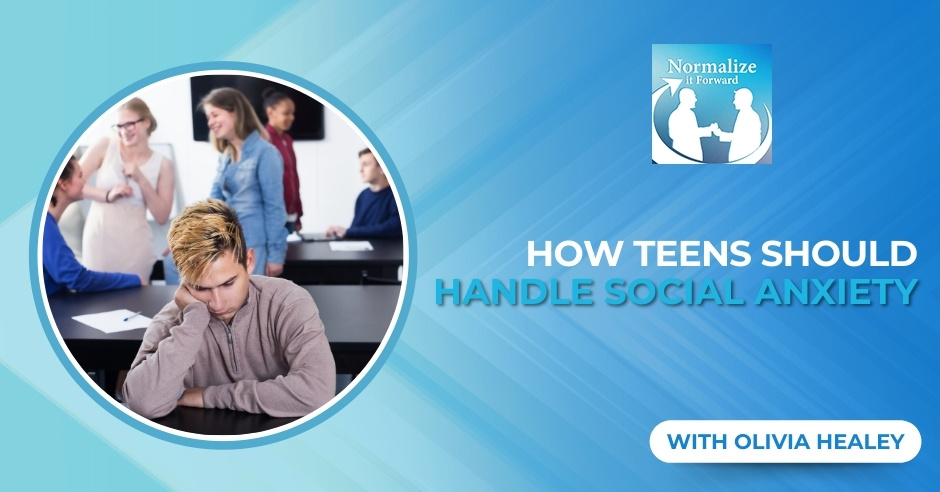
Many teenagers these days, despite their interconnectedness through digital means, are suffering from social anxiety. Their mental health is not that well, and panic attacks are becoming all too frequent. Actor and screenwriter Olivia Healey shares how she uses her storytelling skills to help young people deal with these challenges and become more open to creating genuine relationships. She warns about the dangers of social media, particularly its adverse effects on teenagers’ social skills and awareness. Olivia also opens up about her own experiences with social anxiety and how she overcame these inner battles to unlock her fullest potential.
Reading about mental health is hard. Let’s schedule a free consultation.
—
Watch the episode here
Listen to the podcast here
How Teens Should Handle Social Anxiety With Olivia Healey
I’m so excited to welcome Olivia Healey. Olivia, welcome. How are you?
Thank you. I’m so excited to be on your show. I’m doing well. How about you?
I’m great. Thank you for being here. I appreciate it. Let me read through your intro for a moment here. Olivia Healey first discovered her love of storytelling at the age of ten when she played Juliette in Madeline’s Christmas in Atlanta, Georgia. She pursued theater for six more years before realizing the depth to which she could take her craft in front of the camera.
Since then, she has appeared in various featured films, such as Grounded, The Family Plan, etc., and moved to LA to actively pursue her career in acting. Not only is Olivia an actor, but she is an average screenwriter as well. She has written over 60 scenes for clients in both LA and Atlanta, and wrote the impactful short film Breathe.
Breathe was screened in June 2023 and received praise from multiple recognized mental health organizations. Olivia has worked with the highly regarded Berman Center to screen Breathe and inspired their patients to express their anxiety through art. She looks forward to continuing her journey, bringing Breathe to more organizations in the hopes of reaching a broader audience. Welcome, Olivia.
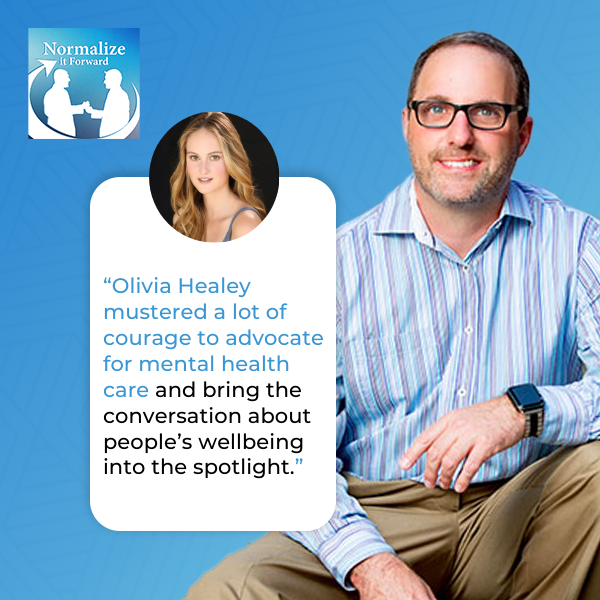
Thank you.
That’s awesome. I viewed it myself, and it was awesome. Breathe was tremendous. Those of you who haven’t looked up Olivia and haven’t looked up Breathe, please do. It is worth your while. I’m curious. Can I jump in and ask you a little bit about that?
Please do.
Finding Purpose In Screenwriting
Your acting career began young, right?
Yes, very.
You then began screenwriting at the same time or after? How did that come about?
After. It came about through necessity because I wanted to tape something to send to the casting directors and agents when I was starting out in the screen acting field versus musical theater. I wanted to play a mean girl, but I couldn’t find the exact mean that I wanted to be on TV and film. Thirty minutes before I went to my coaching, where I was going to tape this little clip, I decided, “I’m going to whip up my own script.”
I wrote myself a very mean girl scene that scared my cousins in Texas and used that to get my very first agent. I had such a blast with that that I decided to keep going from there. Since then, I wrote Breathe. I’ve written for clients both in Atlanta and Los Angeles for little scenes that they can put on their reels, like I did for casting directors. I’m writing a screenplay, which you’ll be seeing within the next ten years on a big screen.
You guys read it first. That’s cool. What is that about?
It is about an unlikely friendship between a high school senior and a man towards the end of his life, and they meet at a therapist’s office. It explores how two people at such opposite ends of life and living different lessons can learn from each other, and then from there, infect each other’s lives and impact people in each of their lives as well.
Dealing With Panic Attacks And Social Anxiety
Speaking of, I’m guessing you were in high school yourself. I would love to ask you a little bit about that. I work with young adults all day long. The premise of the show is to bring the conversation of mental health and wellness to the masses, get people talking more about it, and normalize that conversation so that people aren’t afraid to talk about topics.
I wanted to ask about your journey through high school, when you think about mental health and wellness around you with your peers, the aspects of mental health and wellness, and how it played out around you in your world in high school. I’m wondering. Can you tell us a bit about that?
Absolutely. First, I’d like to say that at the time when I was in high school, experiencing mental health for the first time, and I was conscious of it, I felt very alone. Upon reflection, I think about peers that I had who were probably going through the same thing. I’m glad that you have this show because a lot of people will probably open up more. Hopefully, grades of peers will open up more to each other, and hopefully, students going through what I went through won’t feel as alone.
Thank you.
It’s so important. I became conscious of mental health at a young age in fifth grade, secondhand through one of my best friends’ experiences, which I’m not going to dive into out of her privacy. I’ve never thought that it would affect me because she was going through depression and some suicidal tendencies. Towards the end of middle school and especially freshman year of high school, that’s when anxiety started to get me.
I will never forget the first memory of me having a panic attack. I’m sure a lot of people reading this might be able to relate. It all started because I didn’t know who I was going to sit next to on a bus on a field trip. That, for a high school teenager, is a nightmare. I remember sitting there having very cyclical thoughts about that. All of a sudden, my heart started racing. I felt like I was going to die, and I didn’t know what to do.I was texting my mom about it, and she didn’t know what to do either. Both had me googling up lavender fields and soothing images to try and do whatever we could.
From there, I realized that I had that scenario more often than I thought I did and that I had something a little bit deeper that I needed to look into and take care of. I had a hard time with social anxiety to the point where I self-isolated a lot. I would have symptoms such as the heart racing. I had a lot of skin flushing in my knuckles, my rosacea, and my cheeks. I would stutter a lot. I would get a lot of brain fog.
I would try to talk to somebody that I was a little bit intimidated by, and not know what to say at all, and then you go home, and you’re so hard on yourself. It wasn’t until I went to traditional and art therapy, and it wasn’t until I separated after COVID and did some online school that I had a lot of time to get to know myself. I understood my triggers and started to see that it didn’t matter who you sat next to on the bus. You grow up a little bit.
Good for you. I have so many questions. I appreciate you taking us through that. Probably my biggest takeaway from what you said is that so many people I’ve worked with have gone through something very similar. Even the buzz phrase, social anxiety, I feel like, whether it’s COVID or whether it’s growing up in this day and age with phones and everything else, social anxiety has become pervasive. It’s everywhere.
Many kids struggle. I was glad to hear you say you reached out to your mom because so many kids struggle alone. They don’t reach out to a parent. I was thrilled to hear you say that you had that individual as a support for you. Social anxiety is an interesting thing. There’s a development that happens from freshman year through senior year in high school of how you’re supposed to be.
Identity. Your peers have a large impact on that. You want your peers to like you. At the same time, you’re trying to learn about yourself. It’s a very hard time. I empathize with anybody going through that.
Impact Of Your Peers On Mental Health
Tell me more about that. I like what you said. Your peers have an impact on that. What do you mean by that?
I feel like, as a teenager or as a kid, we learn a lot through observational learning and mirroring. A lot of times, we don’t see our full identity at home, if that makes sense. That’s a part of who we are. We then go out into the world, and we want to find those other things that we connect with. A lot of times, we see that in our peers. If you like something that your peers do, and if you see somebody that you want to be friends with, you reach out to them or mirror them.
For somebody with social anxiety, if you reach out to this person and it doesn’t exactly go the way you want to go, it turns into, “We’re not going to be friends.” Instead, it turns into, “What’s wrong with me? I did something wrong. They don’t like me.” That’s not correct, but that is the physical response that you have. As I’m much older, I’m able to take a step away.
I was explaining this to my mom in acting terms. When we go on sets, we have takes. We shoot 1 take of 1 scene. If it goes poorly, it’s okay because you have a whole other take. As an adult, I’m thinking about social situations the same way. If I go to a coffee shop and I leave, and my friend felt a little bit more distant or didn’t laugh at the jokes that I make, and I didn’t feel like we connected as much as I wanted to, instead of leaving and immediately thinking the socially anxious thought of, “I did something wrong. This person doesn’t like me,” I try to let it go and be like, “Maybe that wasn’t my favorite take, but we’ll get them next time.”
That’s right. That is a good way of looking at it.
Usually, it does happen. You never know what’s going on in somebody else’s life, and it’s usually never about you.
You never know what is going on in somebody else’s life, and it is usually never about you. Share on XThat’s a good way of looking at it and a great piece of advice for young people to know. A lot of young people, when they head into high school, have that sense of self that’s negative. Immediately, when something doesn’t go well, they blame themselves. As you get older, hopefully, and certainly, in your case, it has happened, you turn positive toward it. It’s like, “Instead of blaming myself, I recognize, eighteen different things could have happened to this person before they saw me.”
The Negative Impact Of Social Media
That’s a good way of looking at the younger high school person and then the older high school individual in terms of social anxiety. Anxiety and depression, I feel like, are everywhere you turn. I don’t know what life was like with some of your peers that you were around in high school, but I feel like most kids that I work with, when I ask them what some of their friendships are like, kids are struggling with a lot of stuff. Do you see that? You recognize that?
Absolutely. I recognize that. I’ve also seen it start young, too, as far as 8 and 10-year-olds I know who are already going to therapy and having anxiety. It’s sad to see. A large part of that could be due to social media and online presence. You were talking about it in your episode with Sue, Dealing With Societal Pressures. The fact that you’re reachable all the time has a major impact on me. To see that start out so young, especially with school and friends, my heart breaks for kids and makes me grateful for the time I did have before phones. It became this large entity.
That’s a great point. I was thinking about that. I was talking about it with a patient of mine. They are about my age. We were reminiscing about playing on the playground when we were in elementary school, going out to recess, and how much fun that was. I bet you that if we drove by an elementary school, we’d see kids playing with their phones. I don’t know if kids are allowed to use them during recess or not, but it’s sad that kids have their heads down and they’re typing away.
You’re right. It’s happening at a young age. It’s important for parents to know that, too, as we’re talking. Some parents will read an episode like this and think, “How can I help my kid?” Lots of parents will try to restrict the use of these, so they’ll say, “We’ll give it to you a little bit at a time,” but these things are pretty powerful. Lids are going to find lots of ways to entertain themselves on it. Unfortunately, it takes away from this.
I have this theory, and I feel like I’m right. I tell everybody about it.
Let’s hear it.
I feel like the things that we are drawn to that we can’t help ourselves from doing as a kid are the things that we’re meant to do as an adult for our career, if we are so fortunate enough to chase our dreams. My brother and I are both examples of that. For me, it was me with my dolls or playing imagination with my friends. I didn’t just dress up my dolls. Instead, I would direct scenes with them. I would act with them. If I didn’t like this scene, I would take it back to one and I would reshoot it the next day.
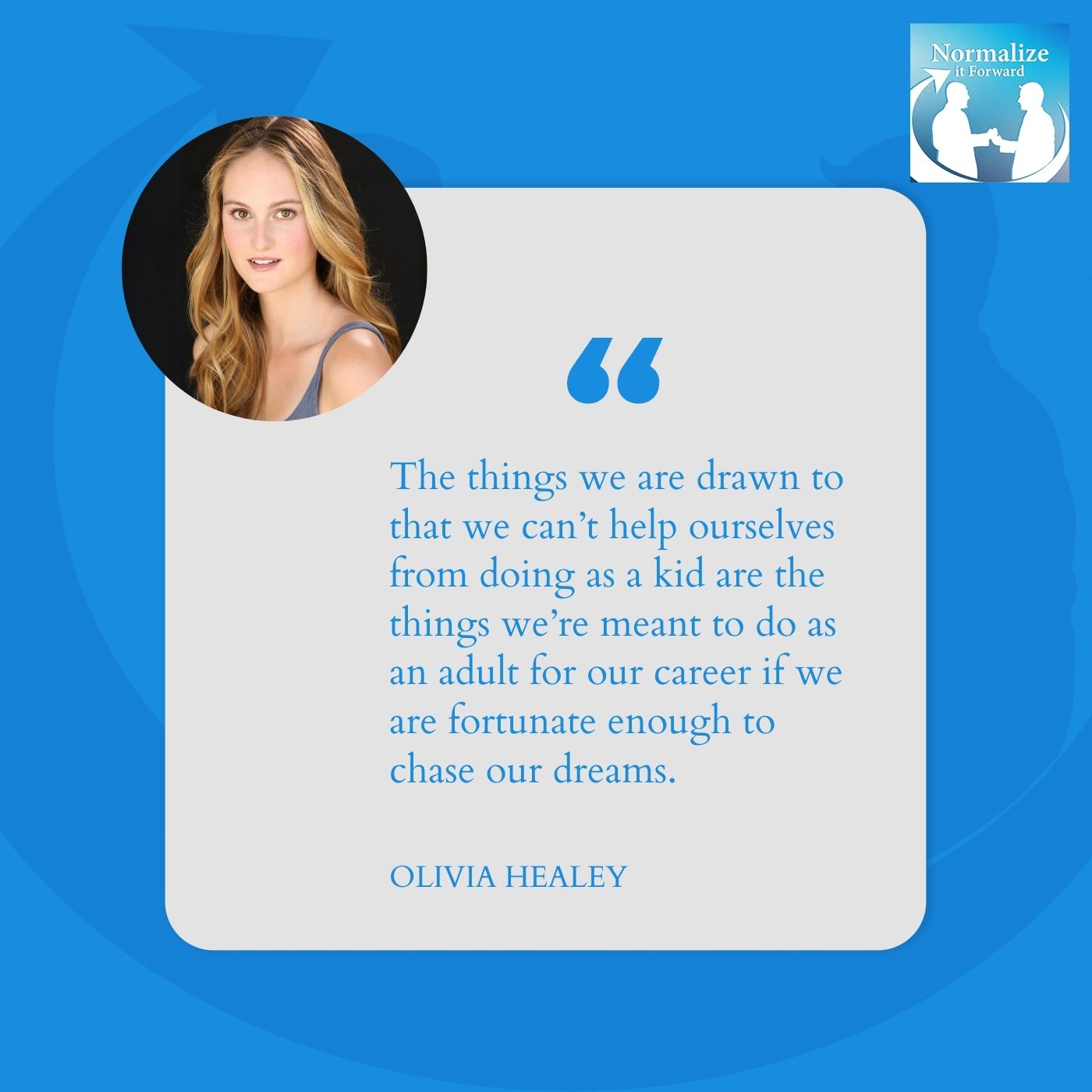
With my brother, he would sit. He had this thinking sword, and he would play with it. Now, he’s this incredible mathematician. I think about that because if we aren’t allowing our brains to be bored at that young age, or if we need to do something to feed that boredom and we’re reaching for our phones, we’re not allowing ourselves to discover those dreams and pursue that passion later in life. Instead, we’re already being affected by dwindling attention spans.
That’s a great theory. I love that, and I love that you used the word passion because that’s what it is. It’s our passion. I, too, have a story similar to where, from a pretty young age, I enjoyed helping my friends with their issues and their problems way before I became a licensed therapist. It fit hand-in-glove for me. When I figured out this profession, I’m like, “I get paid for this? This is unbelievable.” I agree with you.
I use that all the time with my patients. Discovering someone’s passion, which is different from yours and mine, and everyone has their own passion, becomes one of the ways that you seek happiness as an adult, if you’re able to discover that. It all goes together. The ability to be bored and the ability to be able to dream, play, and do those things when you’re younger gives you that concept. So I love that theory. We have to name that, like Olivia’s Theory.
Please do. You proved me right with your personal connection.
I talk about this a lot in my show. It’s no secret that the anxiety levels of young people, unfortunately, are at an all-time high. Unfortunately, the depressive symptoms and disorders are also at an all-time high. Suicidality is the second leading cause of death in young people. That has moved in all the wrong directions. Several years ago, it was number twelve. It has gained in strength. It’s unfortunate.
That’s one of the topics no one wants to talk about, but it is out there. We hear about it all the time, whether it’s public figures in the news or whether it’s private family, friends, or friends of friends. I hear about it way too often. I often ask my guests. We point to things like social media, phones, and other things as reasons why. I want to ask you. What do you think? What comes to mind when you think about why mental health is in the place that it’s in?
If I were to point my finger, I would point it at social media, to be honest. That’s when I saw it affect me and my peers the most. My generation is the Guinea pig generation for social media and how it affects young minds. I would also suggest that we are more open about talking about it than other generations used to be.
If we need to feed our boredom by reaching for our phones, we are not allowing ourselves to discover our dreams and pursue our passions later in life. We are just dwindling our attention spans. Share on XI know my parents and I, and we’ll probably touch on this later, had a hard time connecting over this matter because it had been drilled into their minds not to talk about it. Maybe these things were already present, but we’re more open about them. We post about it on social media, so more people are more aware. I know that there are some people who believe this awareness may not be good because sometimes, if you suppress it, then we can keep moving on. I would disagree with that.
How Adults Should Discuss About Mental Health
I would, too. I’m glad you brought it up, though. It’s important. The premise of the show is to bring this conversation forward and to help not only young people, but adults as well. Parents who are in their 40s and 50s, like myself, grew up in a generation where it was somewhat taboo to talk about these topics, so we’re going to parent in that same way. How do we talk to our kids about depression, anxiety, eating disorders, bipolar disorder, and all that stuff if we can’t even talk about it amongst ourselves? You brought out an excellent topic. In some ways, I feel like kids teach parents when it comes to topics like this, right?
Absolutely. My parents and I have talked about that a lot. To plug my short film, that is who I created it for originally. It was not just patients with anxiety that are going through the same thing as me, but especially for systems. My mom and my dad are two of my best friends in the entire world. I saw how much they were struggling with the fact that they couldn’t understand. I saw how much it rocked their world. I felt like the only way words could help was by using adjectives, which never quite got to how I was feeling. To tell you the origin story of my film.
Please.
After many disconnects with my mom, and it was pushing us apart, I went to my therapist’s office and I told her, “I can’t connect with my mom. We’re having a hard time.” She said, “Are you looking at it from a descriptive point of view? What if we looked at anxiety as what it looks like to you, not how you can describe it with words?”
For some reason, something that clicked with me was this metaphor of a white room with four white walls where I wake up in it when I’m in a panic attack or a moment of high anxiety. I don’t know where I am, but I receive a note that tells me to look for a door, and there are no doors in this one. As I’m looking around, I keep receiving more notes telling me to go faster and that the clock is ticking, which does not help with the panic. The physical symptoms set in. I feel like I’m suffocating, and I pass out. The only thing that can get me out is focusing on breath, and then I leave exhausted. I never know when I’m going to re-enter that room.
I connected with that as a metaphor for my anxiety, so I drew a picture of that with my therapist. When I got home that day, I wrote that story out in short story form in my journal, and I had my mom read it. That was the first time in all the years that I’d been going through this paralyzing anxiety that I saw my mom understand, and she vocalized that.
That moment with my mom meant so much to me, and later my acting coach as well, who I wanted to understand me a little bit more. I wanted to turn it into a film so that it could be accessible to other people, so they could then share this with their support systems as well, and hopefully have that moment of connection. With art, when you’re looking at it or you’re listening to it through music, a lot of times, it can do what words simply cannot.
When you are looking at art or listening to music, it can usually do what words simply cannot. Share on XI agree. What an awesome description. What a fantastic concept. I’m thinking as you’re talking that I have had so many patients try to explain a panic attack in my office to their parents. It’s almost like they shoot and miss. They try to describe it, and the parent is like, “I don’t understand that.” Your description resonates with me. It resonates because it’s your pain. It’s first-person.
It’s, “I’m looking for a door that’s not there, and there’s all this pressure that’s saying, ‘Come on. Let’s go.’” That feeling that a person has had, and many individuals I’ve worked with over the years have had, is not only hard to describe, but it’s hard to get through. Once it ends, the last thing you want to do is tell someone about it. You’re glad it’s over. Unfortunately, you may be going back to that room at some point. That’s powerful. I appreciate you sharing that. I’m hoping that people tuning in do look it up. It is an opportunity and a tool for parents to understand anxiety at a deeper level, specifically with panic attacks. That’s great.
Thank you. I hope so, too.
Anxiety Could Never Stop Anyone
That’s wonderful. I enjoyed listening to you. For young people, it takes a lot of courage. I always say courage is the opposite of anxiety. It takes a lot of courage to be able to talk about some of these things in a way that you’re helping other people understand you, and therefore putting people in your corner to be able to support you and assist you in the future. I appreciate all of that. It’s admirable that you’ve gotten to that level with not only your therapy but also your parents. For those kids who are in high school and are suffering, and they’re suffering in silence, I’m wondering if you could speak to them for a moment. What would you say?
You made me tear up because I understand. That’s the first thing I would say. Those memories still affect me, but they also make me proud of who I am. I would say to them, “You’re perfect the way you are with that struggle. You don’t have to end that struggle.” I remember when I was that age, whenever anybody asked me what my biggest wish was, it would be, “I hope I never have anxiety again.” That’s not true. I still wake up in that room sometimes. I have anxiety on the reg, but I am out in California living my dream, pursuing one of the scariest careers. I don’t let that anxiety stop me.
Your anxiety is going to be there with you, and that’s okay. There’s nothing wrong with you. Whatever your dream is, whether it’s academic, athletic, artistic, or inspirational, you can do it. That anxiety is not going to stop you. You’re already so strong, but the battle that you fight to understand yourself is so special, and it’s only going to make you stronger in adulthood.
Olivia’s Self-Care Regimen
Great message. You’re describing managing it rather than it managing you. I love that message. It’s a message of positivity. It’s a message of understanding. I know people reading will resonate with those words. I appreciate that. Let me shift for a minute and ask. Self-care is a topic that gets talked about a lot. It’s a buzz phrase used in my field. People define it in lots of different ways. I wonder. What does self-care mean to Olivia?
I am into skincare. Taking care of yourself externally that way is fantastic, but to me, self-care is listening to what your body and your brain need. If you’re an extrovert, that means to get away from people for a second and go spend time with yourself. That’s a form of self-care. I’m very much an advocate of exercise. I move as much as I possibly can. Right before this, I wanted to feel more confident and level-headed, so I went for a walk out in the sunshine and got those vitamins and that fresh air.
Self-care is listening to what your body and brain need. Share on XMoms and dads who are probably reading this are probably going to clip this for their kids. I apologize to the kids for doing this to you. My mom used to tell me all the time whenever I was anxious to get outside. She was like, “Go for a walk,” and I never wanted to. Once I started doing it, I realized that she was right. I’ve used that to this day. Getting outside doing something that regulates your heartbeat is even more self-care than something that’s a little bit more vanity-based. Singing, for example, could be self-care because it regulates your breath, or something like that.
I agree. I love what you said. It’s amazing how many people I’ve asked about self-care, and how many people from all different backgrounds talk about exercise. Exercise is something I’ve always done in my own world. I’ve always believed it. It helps clear your head. I love what you said. You separated into vanity versus other things. Self-care is defined personally. It’s defined by that person.
One thing I heard a long time ago that stuck with me was at a gym. It was a billboard that I was reading as I was getting a drink of water and catching my breath. It said there was a study done. It was a study many years ago. It talked about how exercise for 25 minutes gave people a burst of the positive feel-good chemicals that we get for up to 10 hours. I thought to myself, “Organic, no side effects, nothing.” One thing that you can do for yourself to exercise give you that kind of jolt and burst, which I always found interesting.
That’s incredible.
Self-care is a big deal. I like what you said about getting outside. A lot of young individuals, especially depressed individuals, the last thing they want to do is get up and get out. It’s the first thing they should be thinking about doing. Make it personable. Put your earbuds in, listen to your favorite tunes, and go for a walk wherever you want. It’s important. If you don’t do it for yourself, probably no one else is going to.
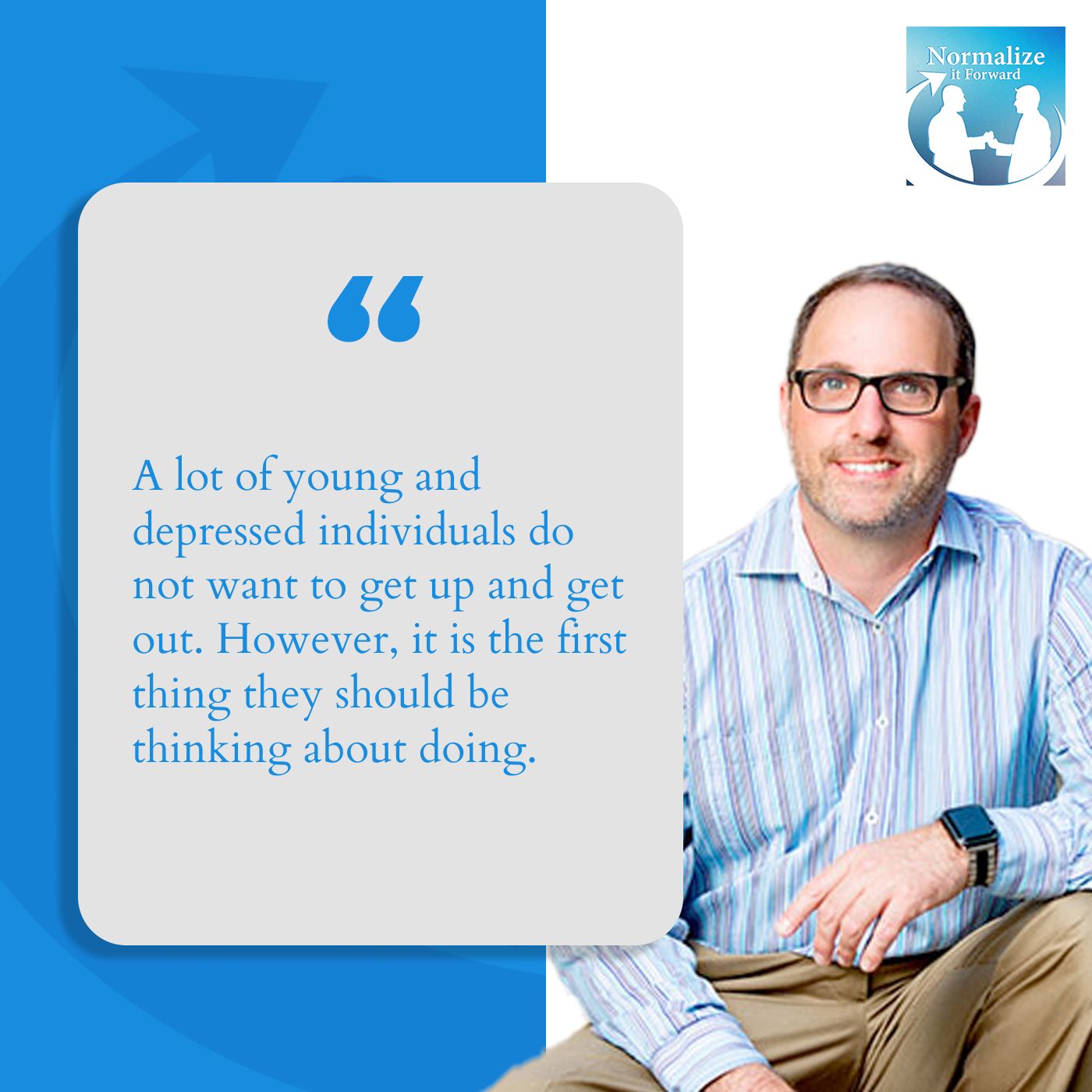
Something you said made me think of this, but probably other people with anxiety can relate to it. My anxious thought is that I have an expectation of how things should look. When I was in high school, I would call it very all-or-nothing. I’ve focused on taking care of this, so I’m a little bit different now, but before I did, I was focused on if I did a workout, it would have to be an hour and a half, or it would have to be this huge massive thing. If I went for a walk, it’d have to be a certain number of miles. Honestly, if you feel like you need to get outside but you can’t get out of bed, if you go out and scowl at the sun and you’re mad about it for five minutes, that could work, too. It doesn’t have to be a perfect thing.
I love it.
When people do that, not even young people, but adults do it as well, they go out, start to get in these routines, and set these hour-and-a-half expectations. You look at them and you’re like, “Who told you to do that?” They’re like, “I don’t know. It was me.”
Odds are you don’t have the energy, which is okay, or the time to do that hour and a half. If you look at your calendar and you’re looking at red dots of when you did everything, you’d be way less consistent than if you did fifteen minutes a day, even.
Get up and get out. I like how you said that. It’s words to live by, in many ways. Number one, I appreciate you taking the time and energy out of your schedule to talk to me and my audience. I know you’re busy. They offer an awesome point of view. In many ways, you’re representing young people, so I appreciate your point of view. You’ve had some great ideas. I always hope that when people read this, there are 1 or 2 things they pull out and they can take with them and use. You’ve given us lots to think about, so thank you so much for that.
Thank you for having me on.
Olivia’s Nominee For Next Guest
I appreciate it. I have one more thing to ask. I want to put you on the spot for a minute. Generally speaking, what I try to do is have all of my guests nominate a friend, a coworker, a relative, or someone you know who you think would be great to have as a guest in the future. Any thoughts as to who you’d like to nominate?
This is somebody that I had the privilege of working with in Atlanta, Georgia. That would be Jill Weinstein from the Berman Center. She is a female powerhouse. She runs her partial hospitalization program. She’s spoken for Teen Vogue. She’s done so many things. I would love to know about her on your show. She could give you a great point of view.
Fantastic. I’ll get her contact info from you offline. I appreciate you nominating her. I look forward to having Jill on the show. I appreciate you taking the time and energy to be with us and offer your perspective. I want to thank you again and tell you to have a wonderful rest of your evening.
Thank you so much.
Have a good one. Take care.
Bye, everybody.
Important Links
About Olivia Healey
 Olivia Healey first discovered her love of storytelling at the age of 10, when she played Juliette in Madeline’s Christmas at the Horizon Theatre in Atlanta, GA. She pursued theater for six more years, before realizing the depth to which she could take her craft in front of the camera. Since then, she’s appeared in various feature films (Grounded, The Family Plan, etc) and moved to Los Angeles to actively pursue her career in acting.
Olivia Healey first discovered her love of storytelling at the age of 10, when she played Juliette in Madeline’s Christmas at the Horizon Theatre in Atlanta, GA. She pursued theater for six more years, before realizing the depth to which she could take her craft in front of the camera. Since then, she’s appeared in various feature films (Grounded, The Family Plan, etc) and moved to Los Angeles to actively pursue her career in acting.
Not only is Olivia an actor, but she is an avid screenwriter, as well. She has written over 60 scenes for clients in both Los Angeles and Atlanta, and wrote the impactful short film, Breathe. Breathe screened June 2023, and received praise from multiple recognized mental health organizations, such as The Georgia Psychological Association, as well as Anxiety Specialists of Atlanta.
Olivia has worked with the highly regarded Berman Center (featured in Teen Vogue and more), to screen Breathe and inspire their patients to express how their anxiety feels through art. She looks forward to continuing her journey bringing Breathe to more organizations, in hopes of reaching a broader audience.
Reading about mental health is hard. Let’s schedule a free consultation.

